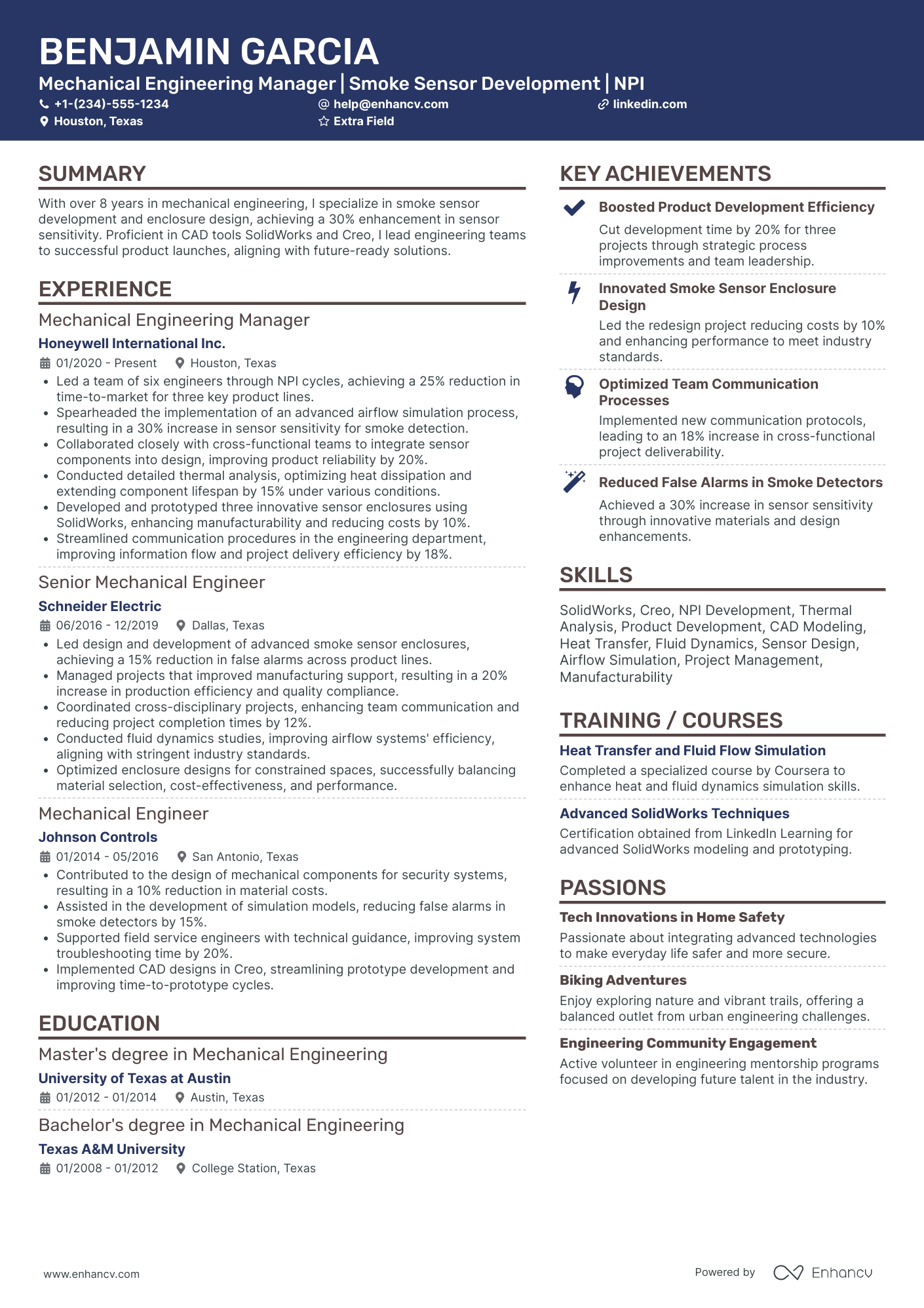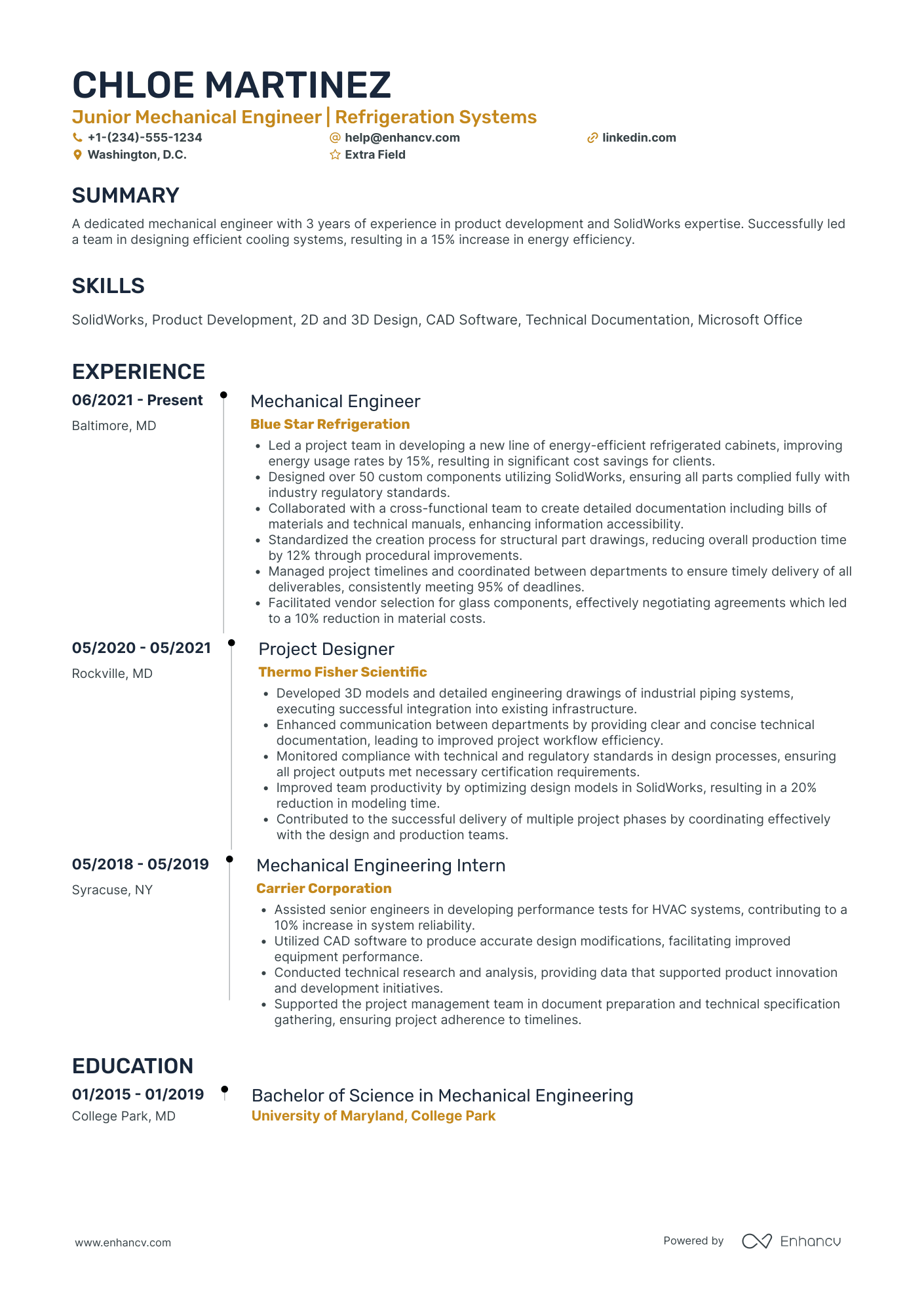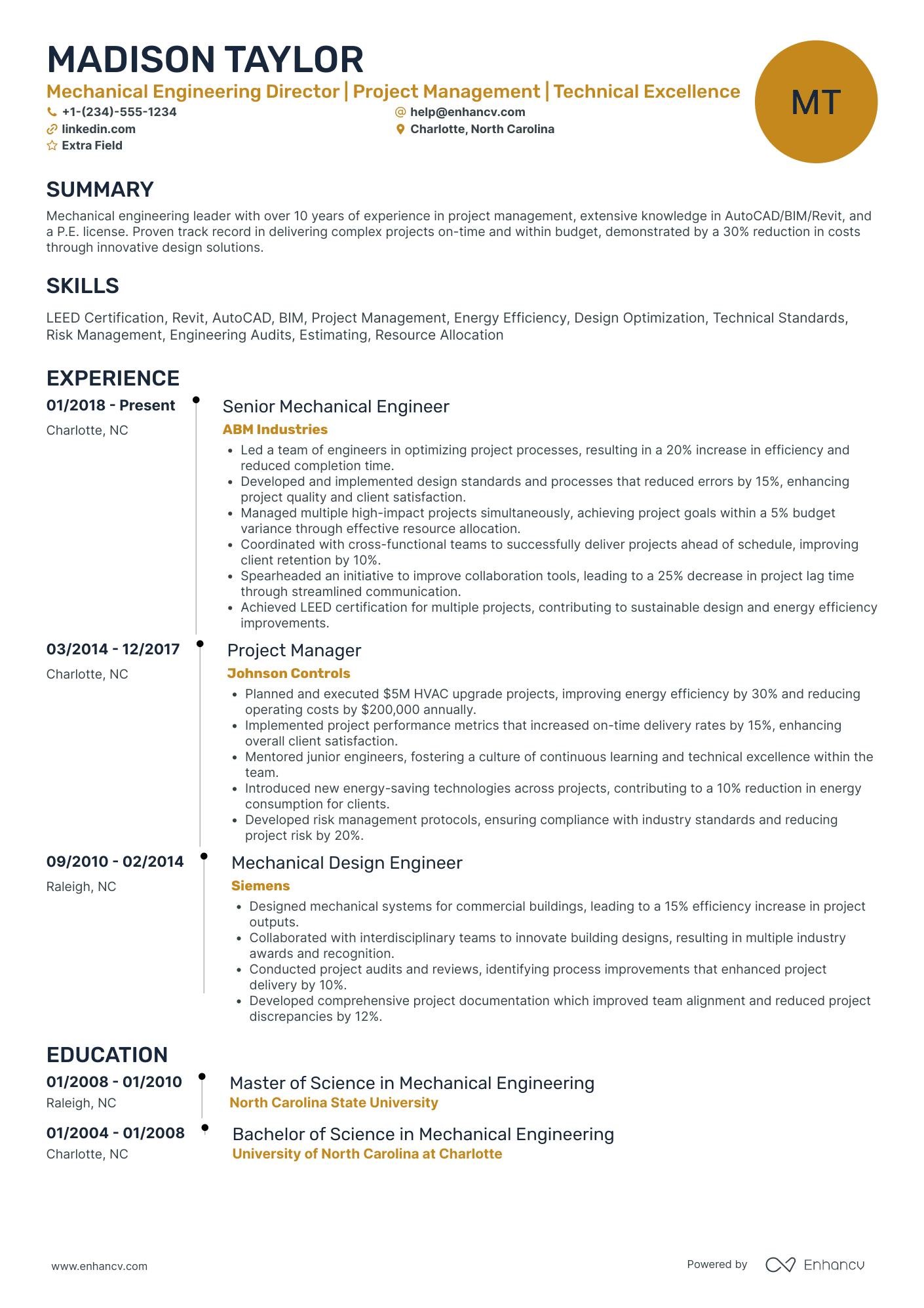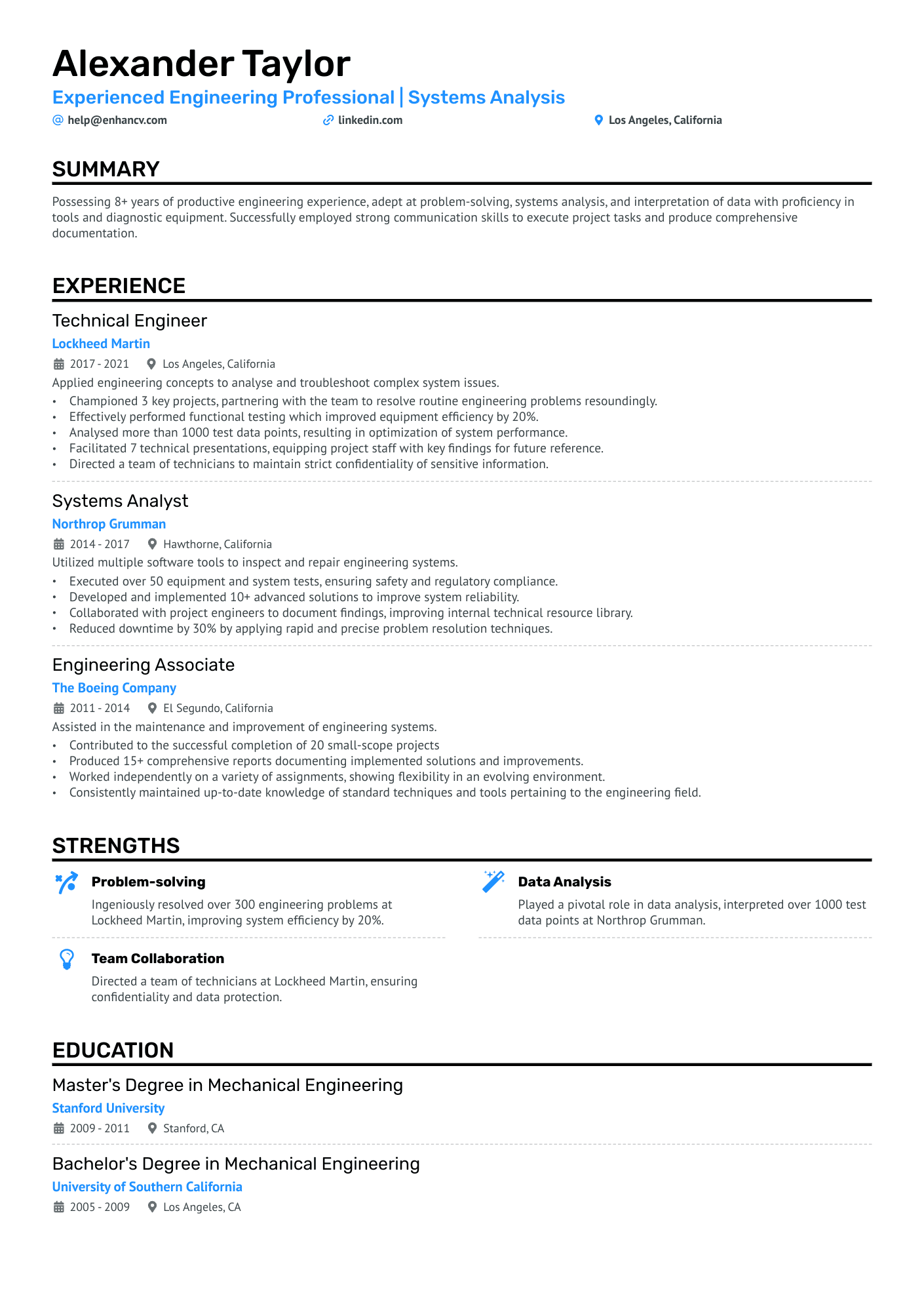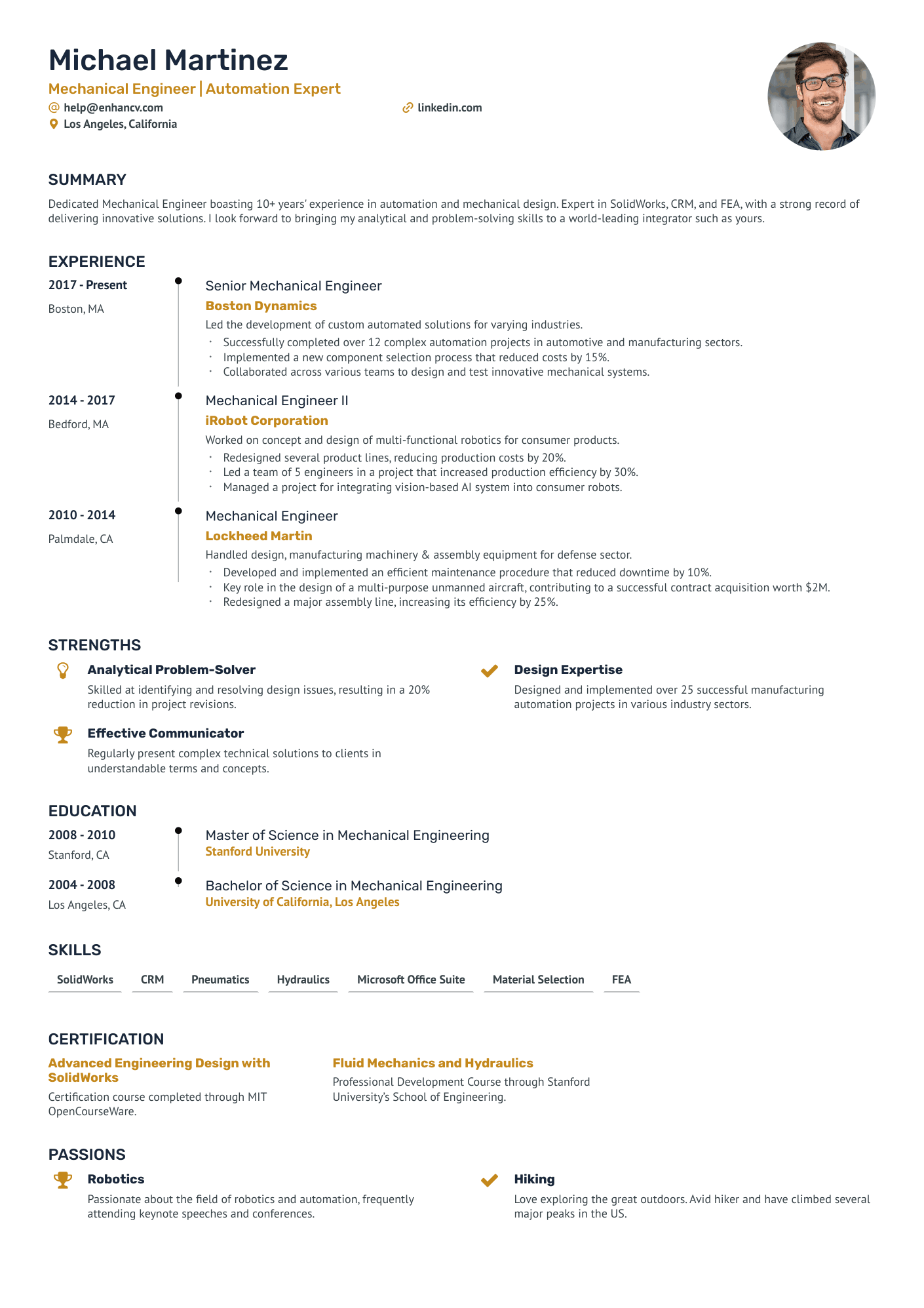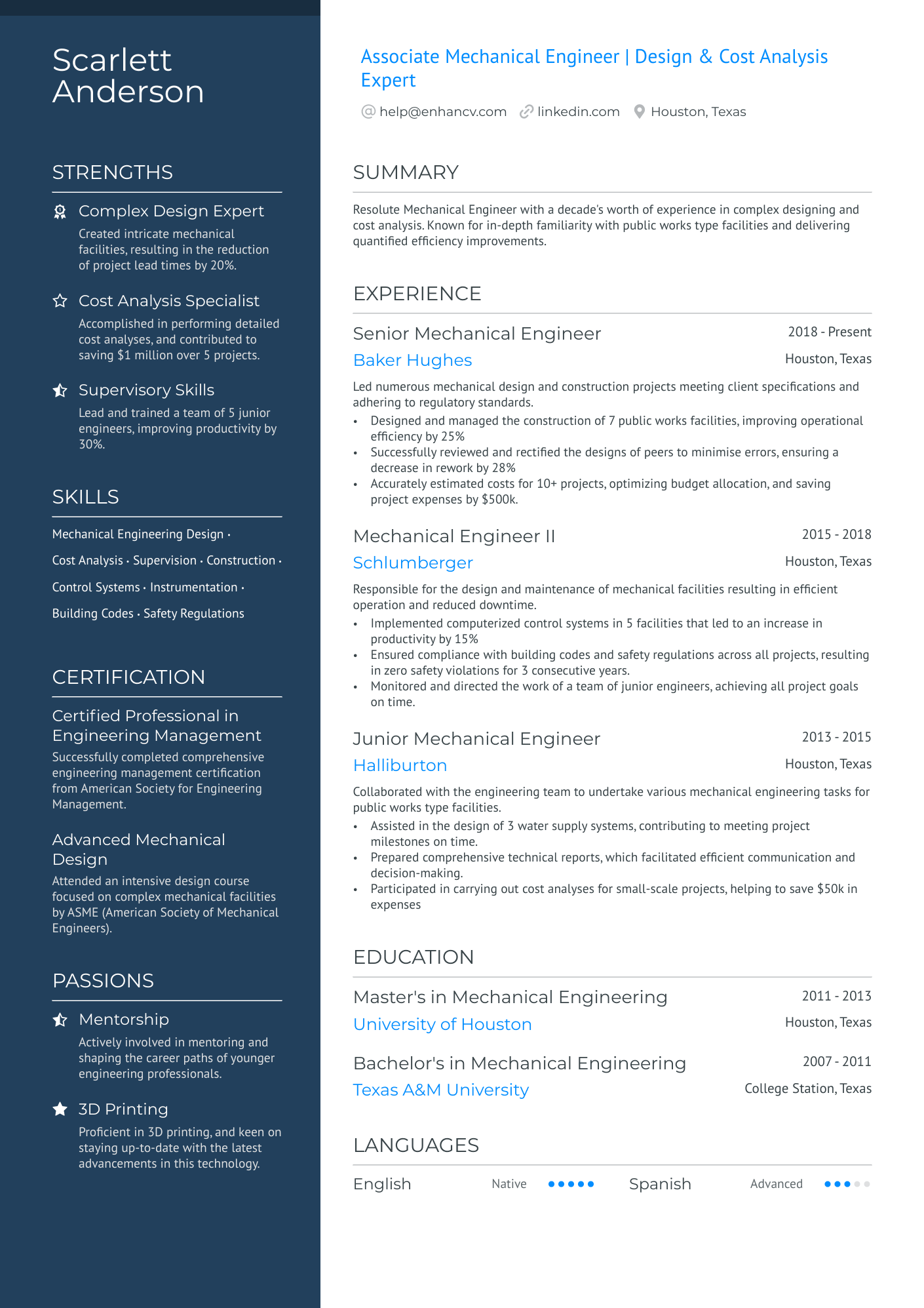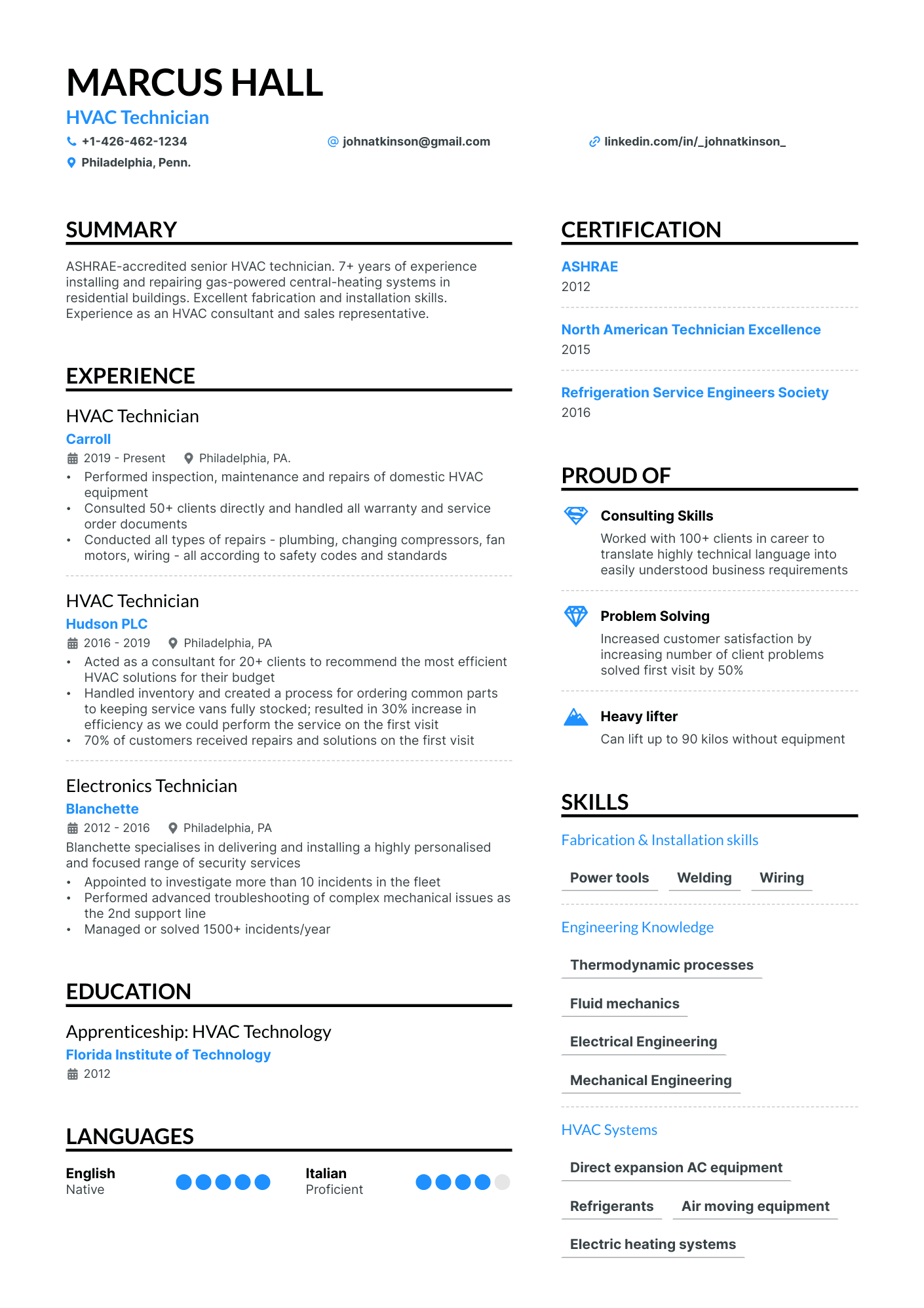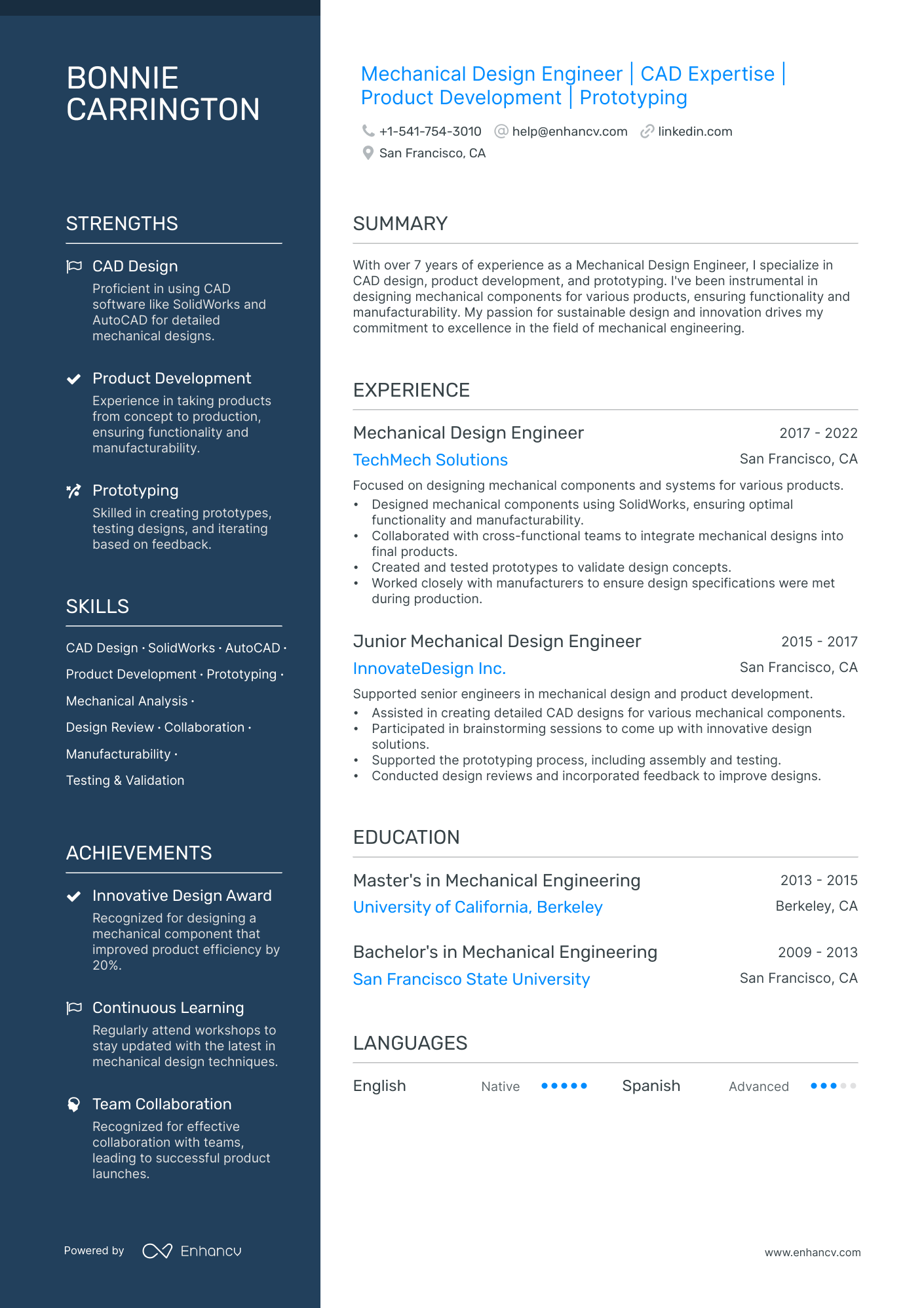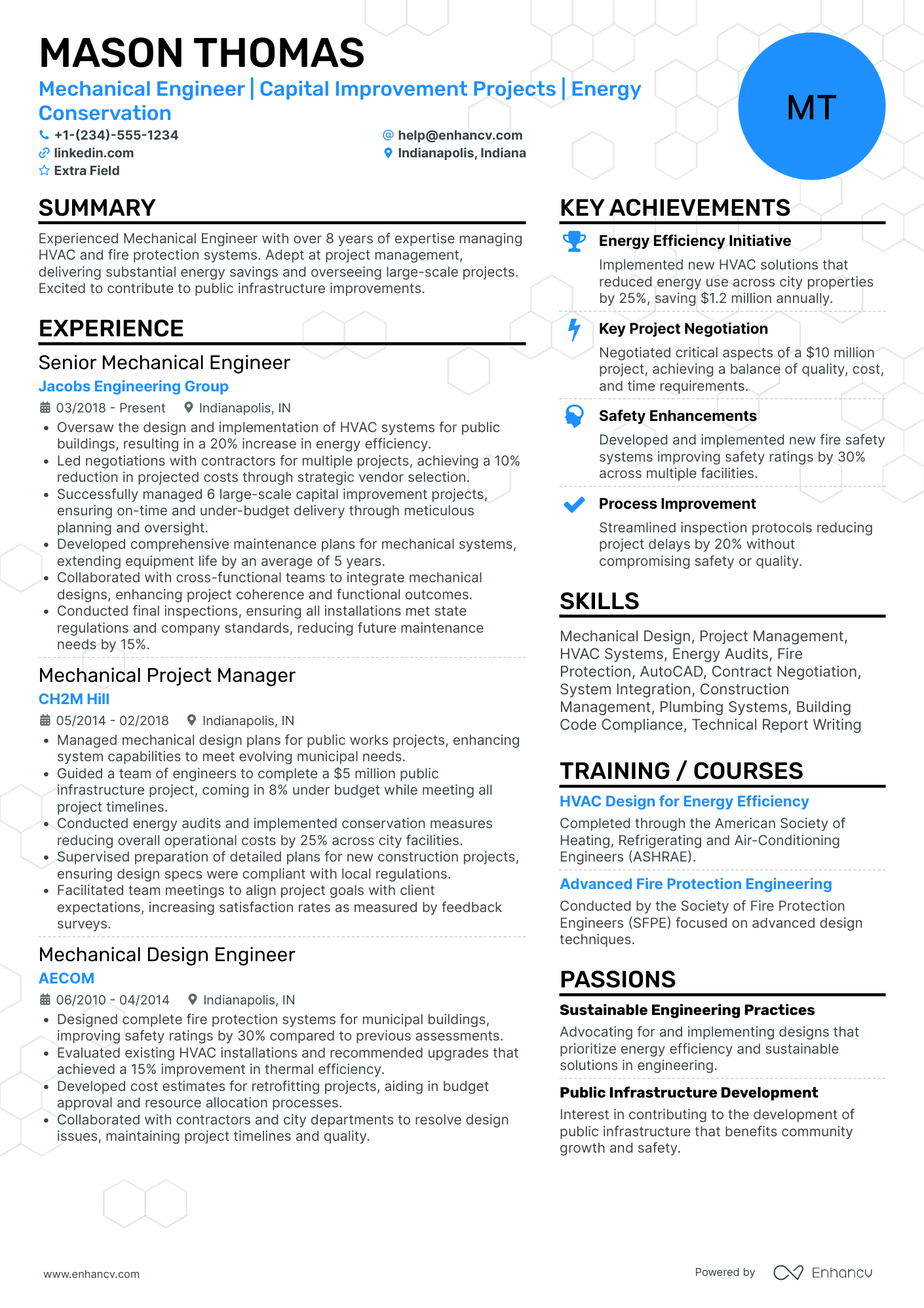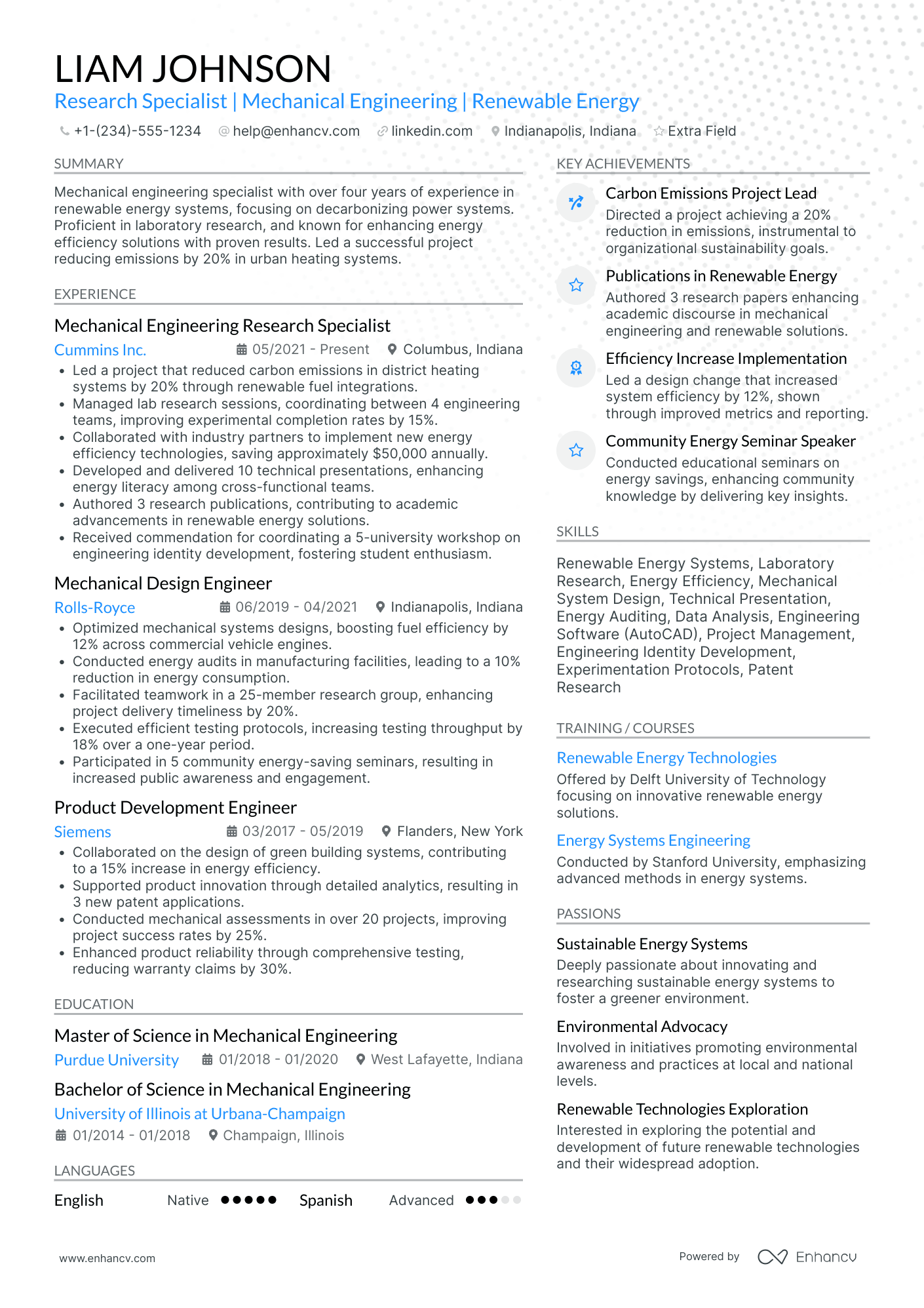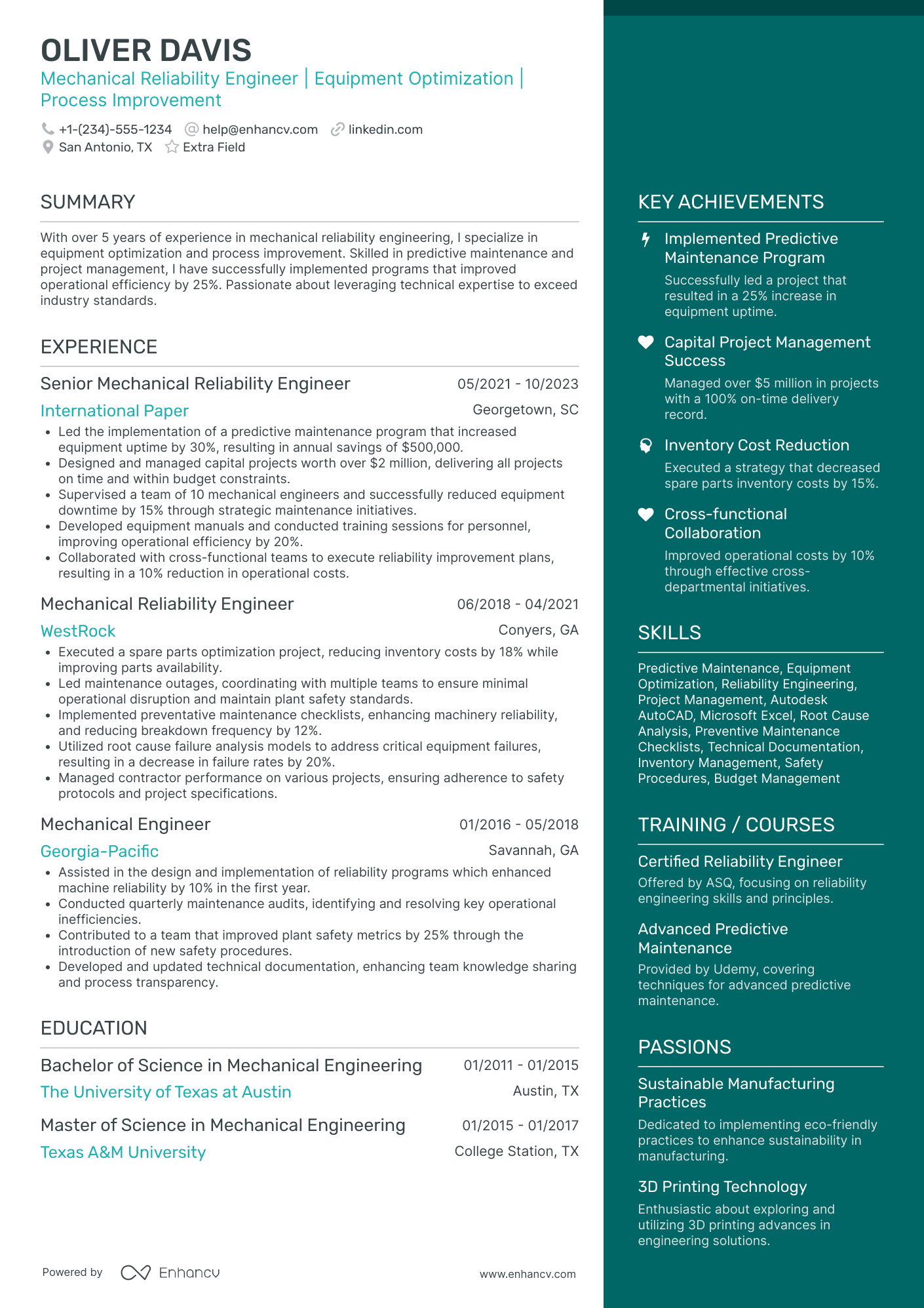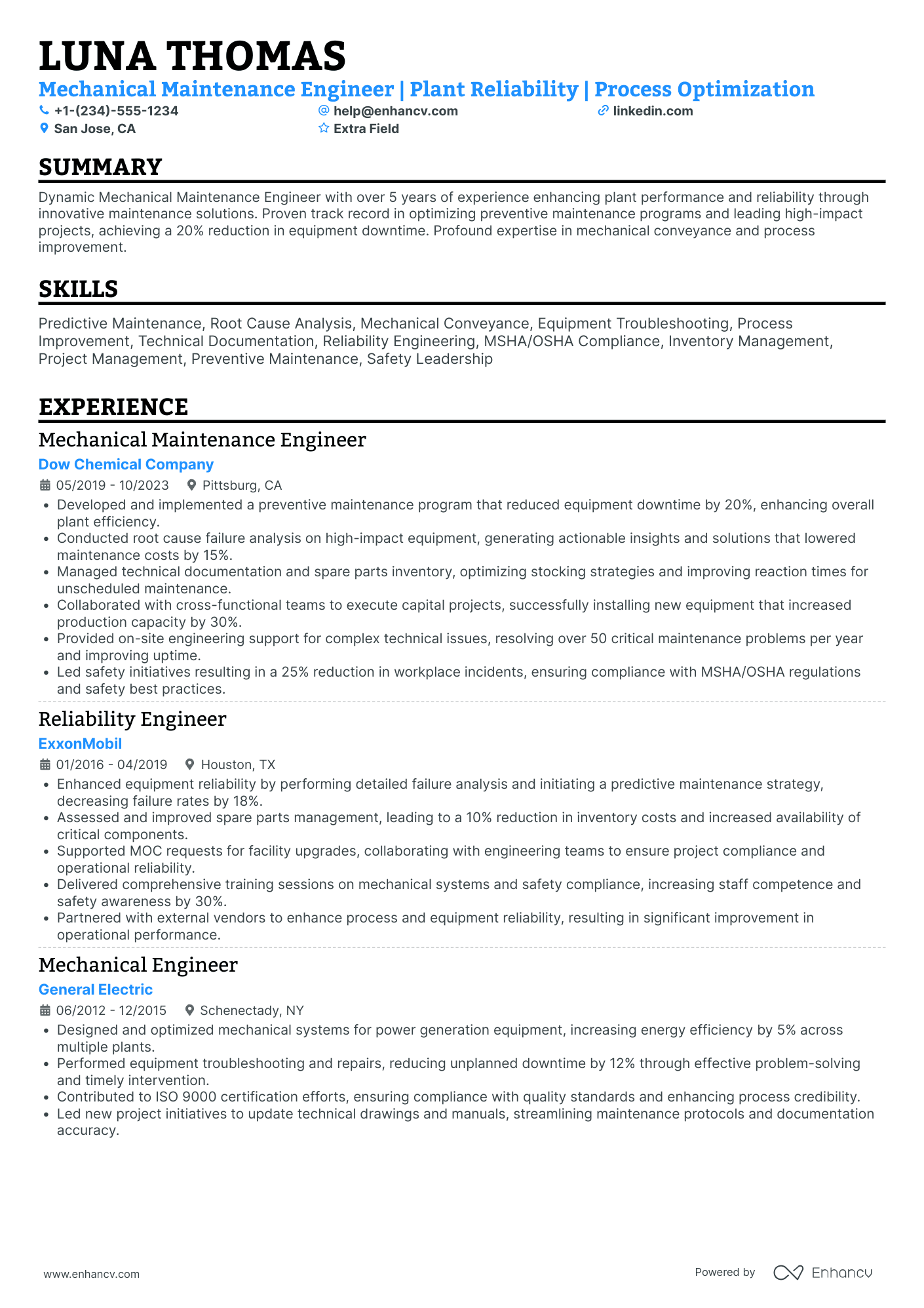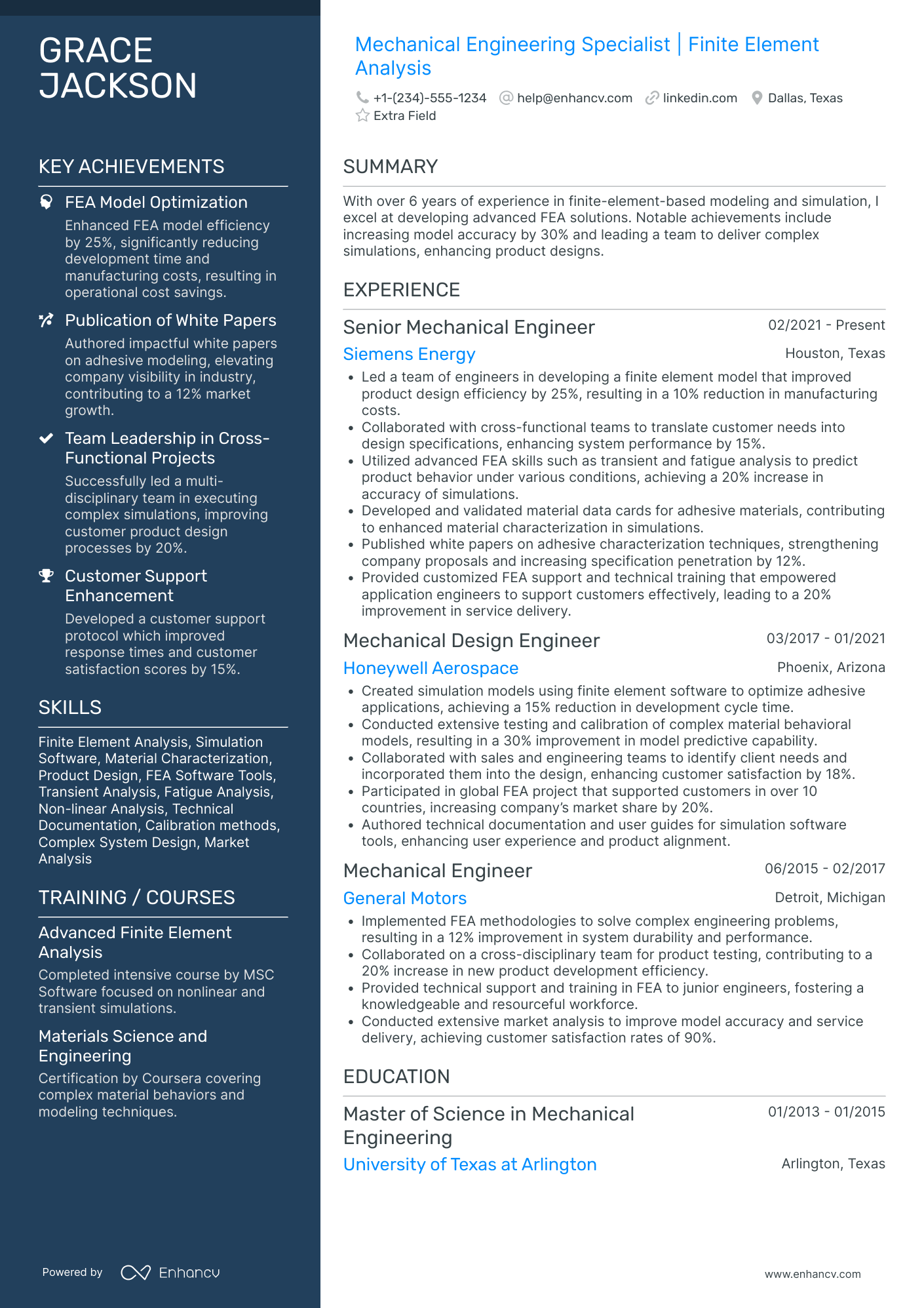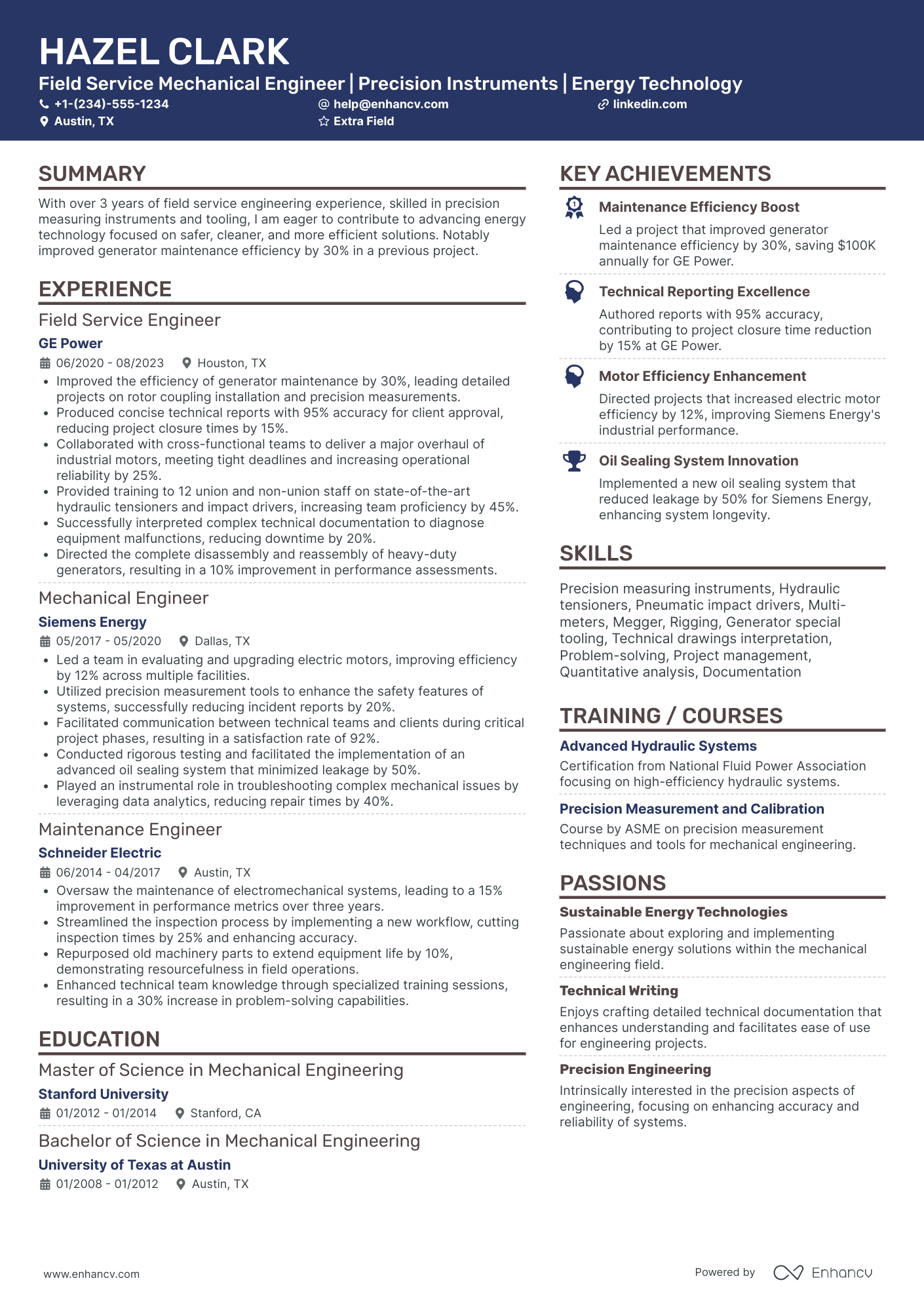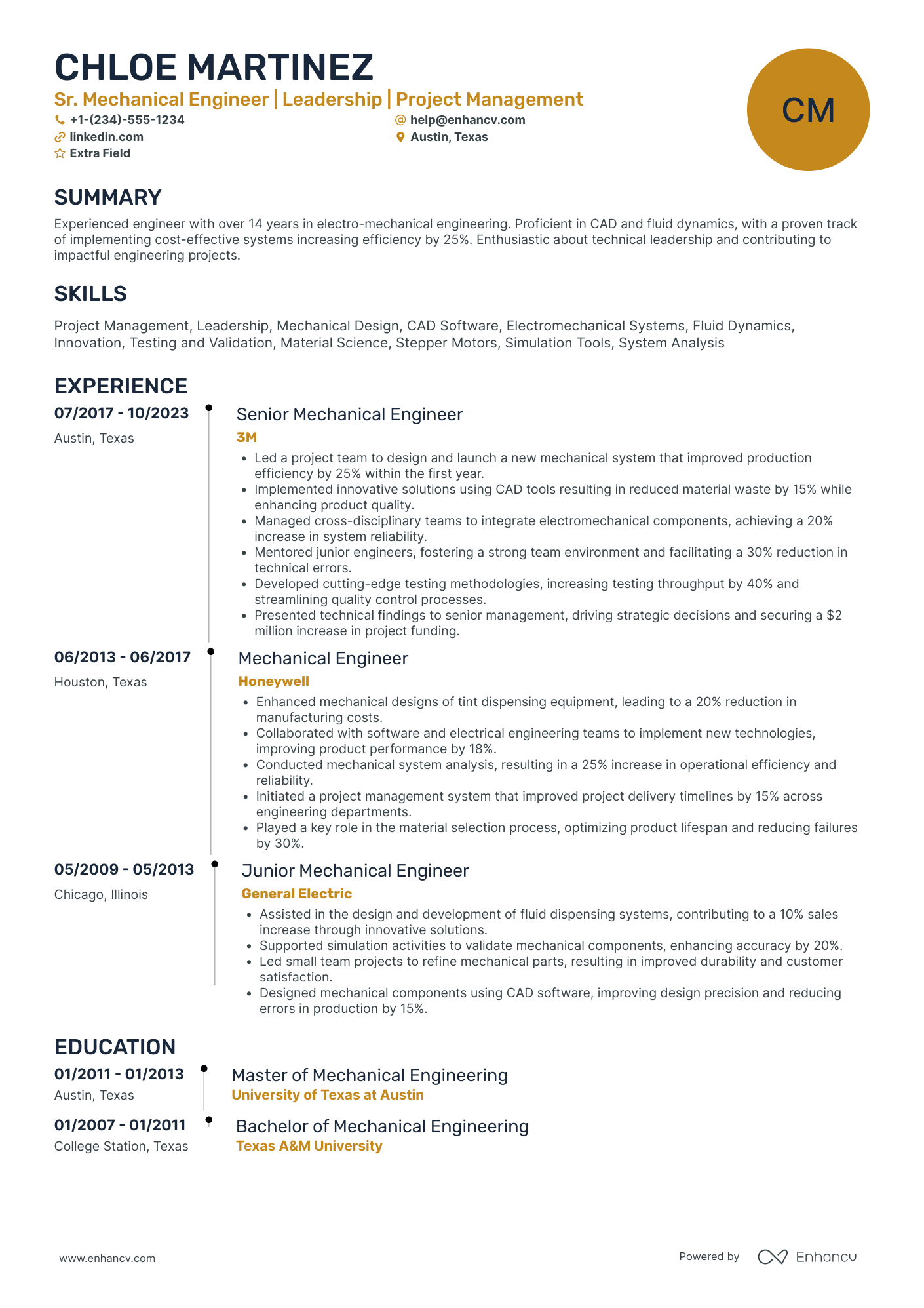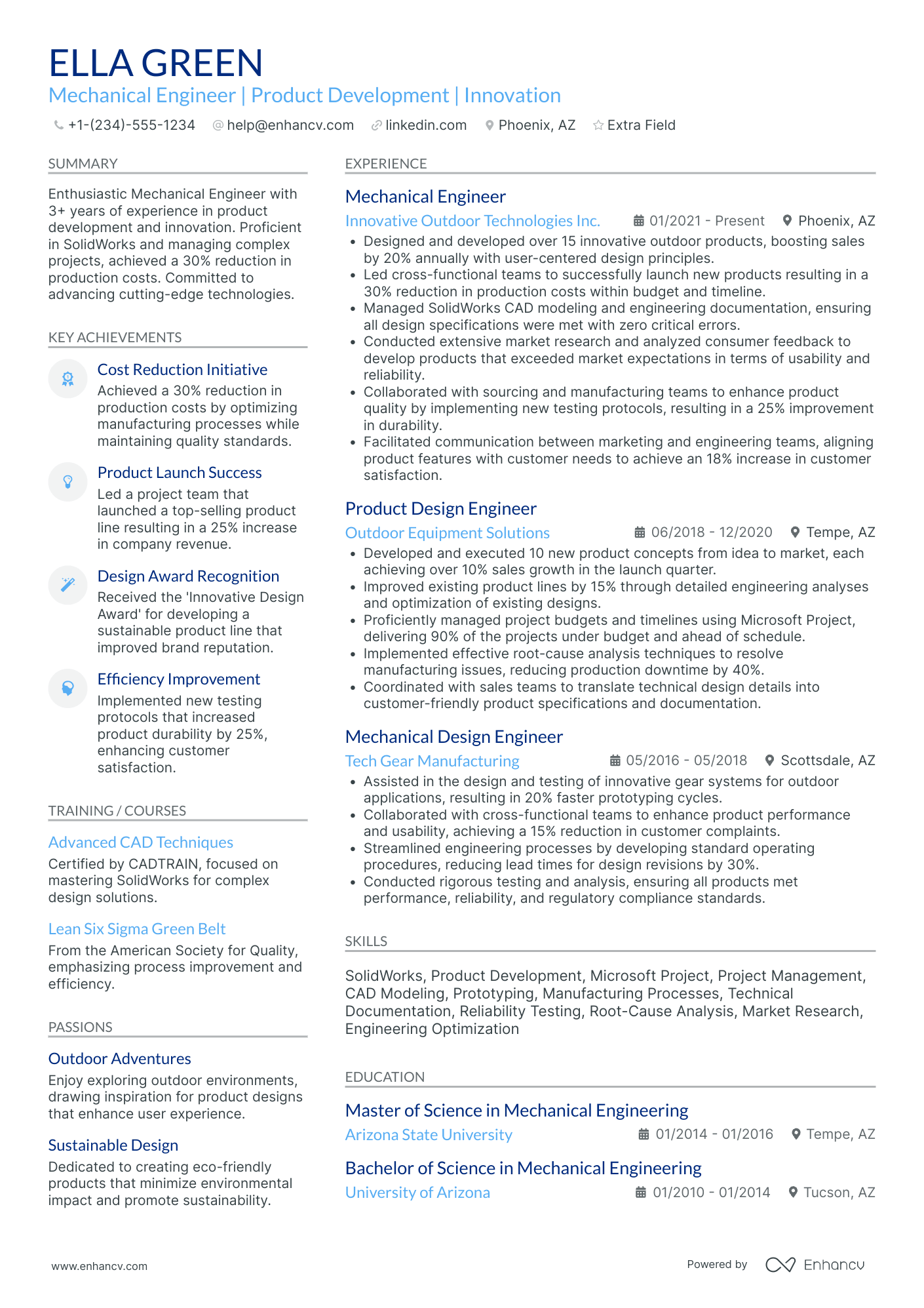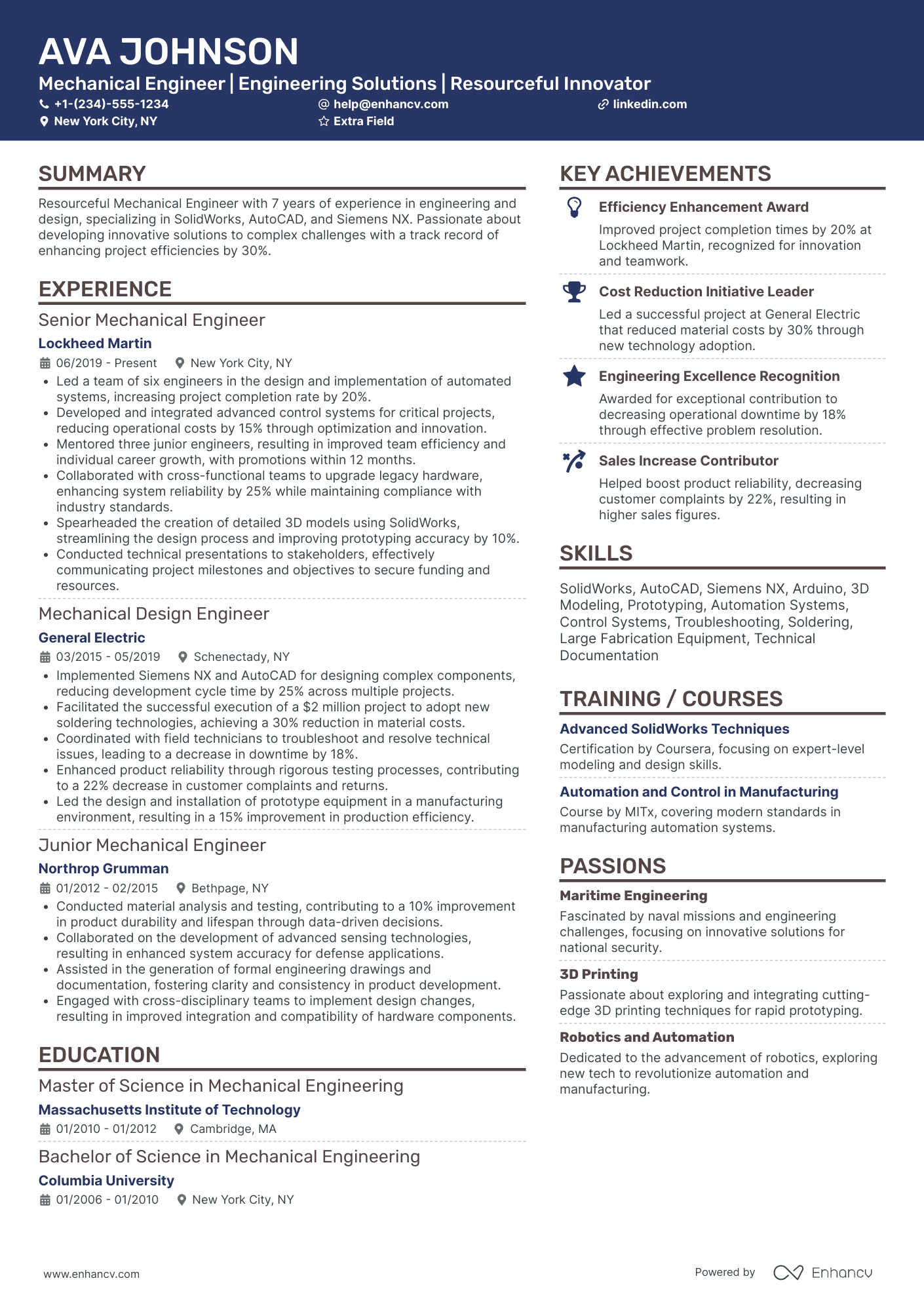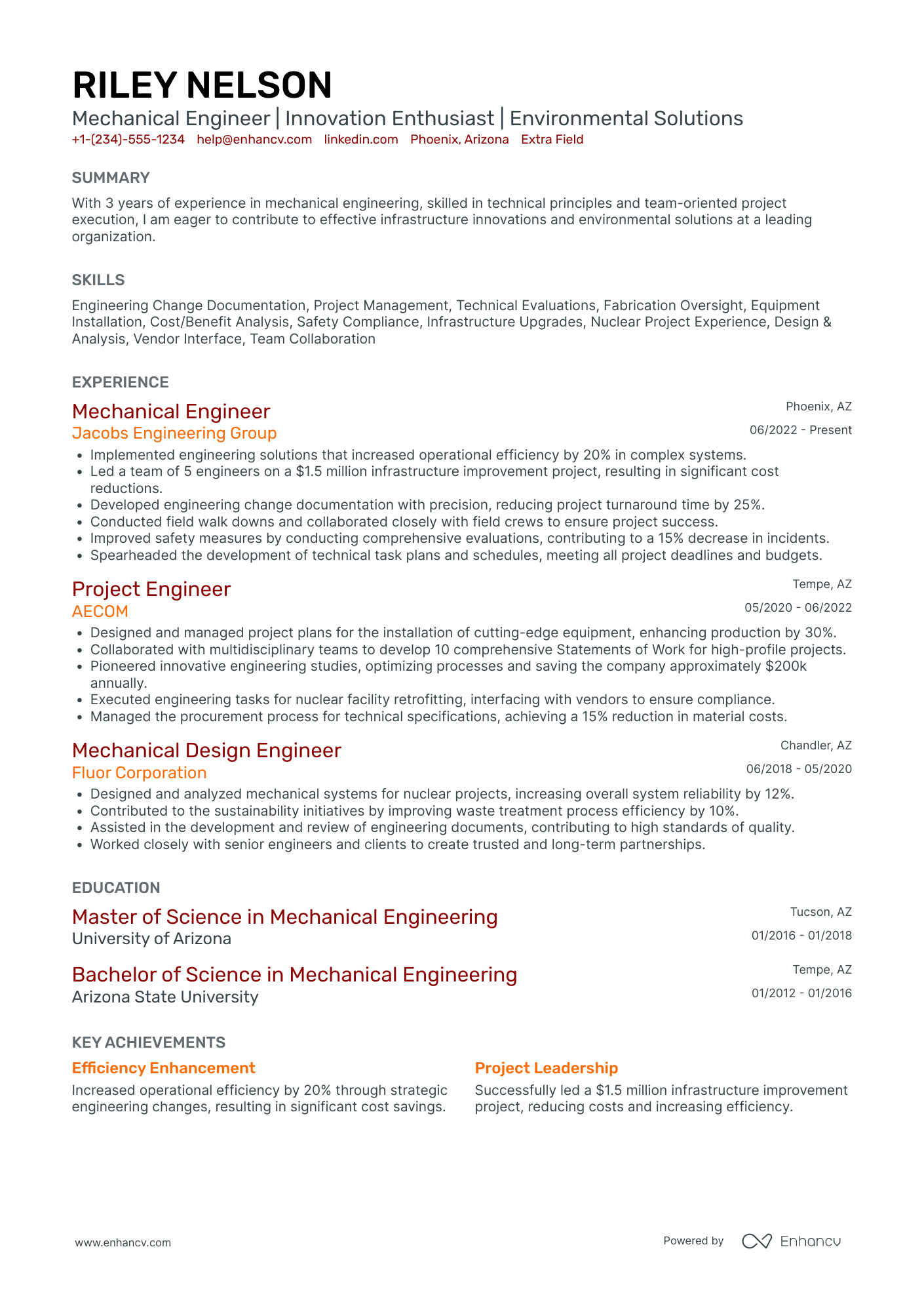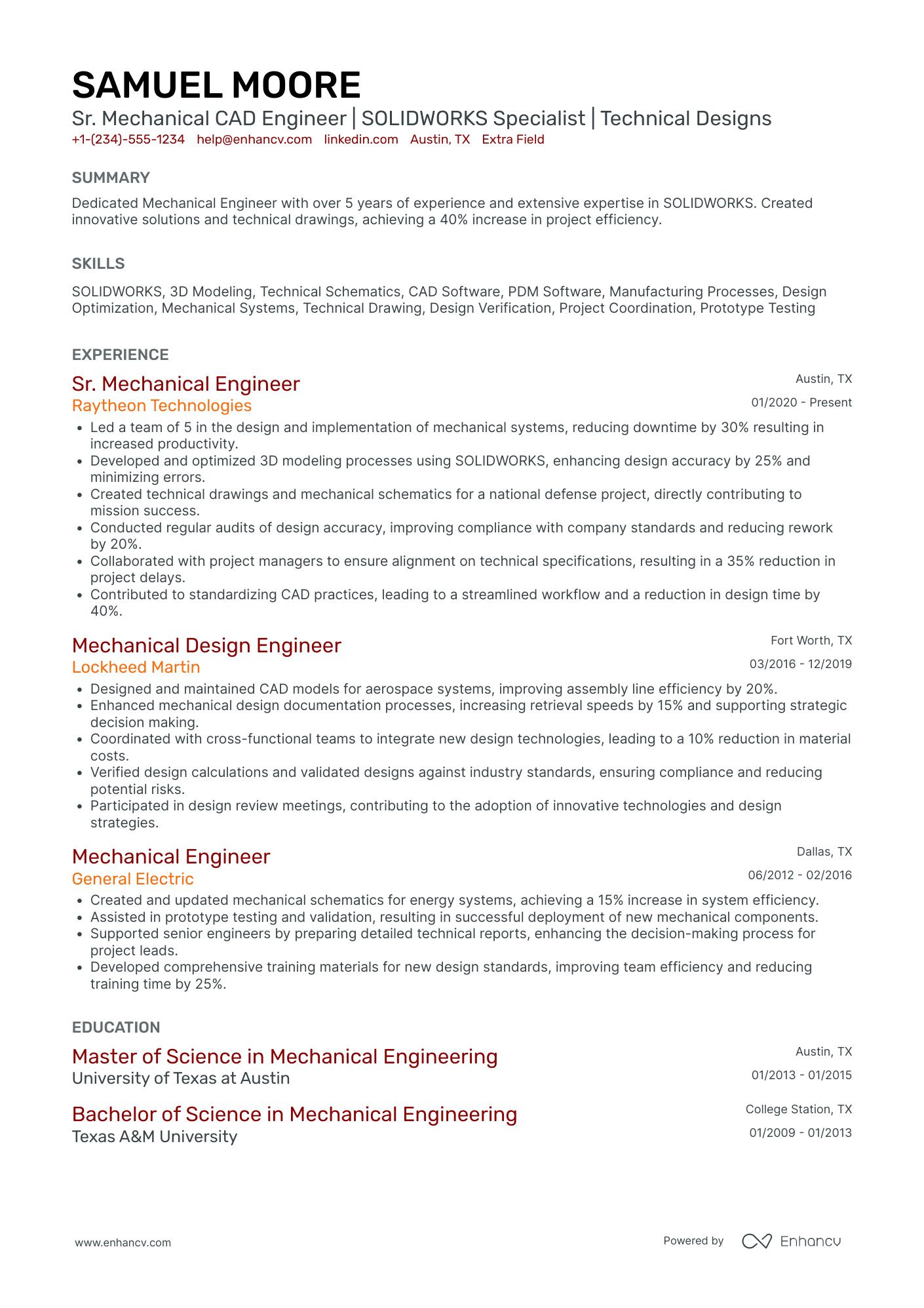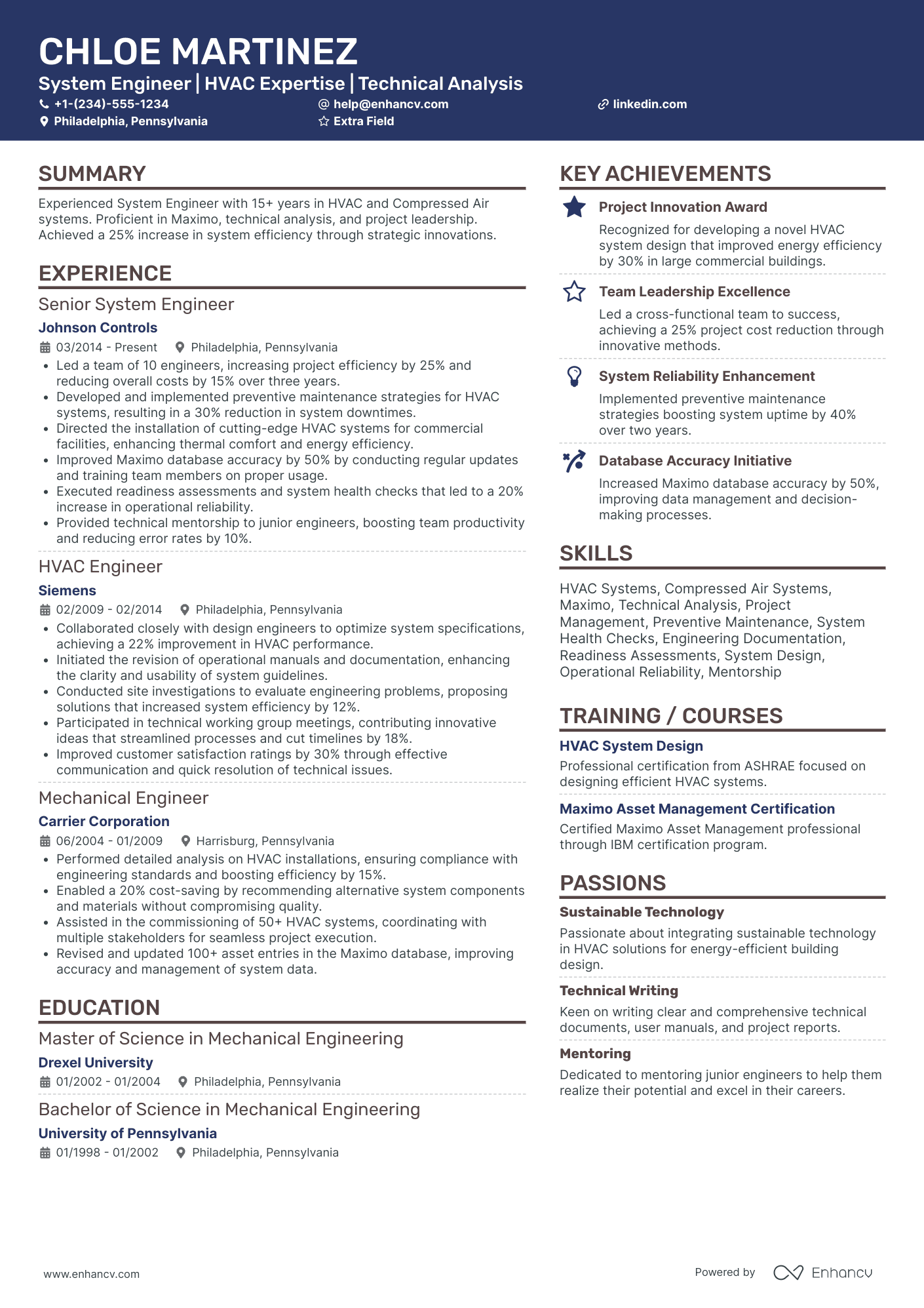Creating an impressive engineering resume can be a challenging task, especially for mechanical engineers who need to showcase a diverse set of skills and experiences. As one of the oldest engineering disciplines, mechanical engineering is pivotal in industries ranging from automotive to aerospace and energy. Additionally, the field is constantly evolving with advancements in automation and robotics.
However, the job hunt for mechanical engineering positions can be tricky. Candidates often struggle to balance technical jargon with clear, impactful descriptions of their achievements. Additionally, tailoring a resume for a mechanical engineer to meet the specific requirements of each job can be time-consuming.
Despite these challenges, the job market for mechanical engineers is robust. The demand for skilled professionals in this field remains high, particularly in sectors focusing on sustainability and innovation. As you prepare to enter this competitive market, creating a standout resume is your first step toward landing an exciting and rewarding position.
Scientists investigate that which already is; Engineers create that which has never been.
Albert Einstein
In this article, we'll guide you through the essential elements of a strong mechanical engineering resume, providing tips and examples to help you highlight your expertise and stand out to potential employers. Let's get started!
Not exactly looking for a mechanical engineering position? Here are some other related guides that could be of more use to you::
- Entry Level mechanical engineer Resume Guide
- Industrial Engineer Resume Guide
- Aerospace Engineering Resume Guide
- Automotive Engineering Resume Guide
Need a cover letter with that ME resume? Here you go!
Now that we've set the stage with the importance of a well-crafted resume and the promising job market for mechanical engineers, let's explore the different resume types and how to choose the one that best underlines your skills and experiences.
How to format a mechanical engineer resume
Choosing the right resume format is essential for a mechanical engineer because it ensures that your skills, experience, and achievements are presented in the most effective way. The right resume layout can highlight your strengths, making it easier for recruiters to see your qualifications and fit for the role. It also enhances readability, ensuring that key information stands out and is easily accessible, which is crucial in a competitive job market.
Let’s have a look at the different types:
- Reverse Chronological Order Format: This format lists your work experience starting with the most recent job first. It’s ideal for candidates with a strong, continuous work history in the field, as it underscores your career progression and most recent achievements.
- Functional Format: This format focuses on your skills and qualifications rather than your work history. It’s best suited for those who may have gaps in their employment or are changing careers, as it emphasizes what you can do rather than when you did it.
- Hybrid Format: Combining elements of both the reverse chronological and functional formats, this format highlights relevant skills while still providing a detailed work history. It's ideal for candidates with significant experience and specific skills to showcase.
Adjust your resume layout based on the market – Canadian resumes, for example, may follow a unique format.
To learn how to write a resume that grabs attention, focus on your key skills and achievements. Crafting a stand-out resume involves highlighting specific projects, using industry keywords, and maintaining a clear, professional format to ensure you catch the recruiter’s eye.
Here are a few more things to keep in mind while you format your resume:
Resume design:
- Margins: Standard resume margins (1 inch on all sides) ensure readability.
- Colors: Use subtle colors on your resume sparingly to highlight key sections; stick to professional tones.
- Fonts: Choose clean, professional resume fonts like Arial, Calibri, or Rubik with a font size of 10 - 12.
- Columns: Two-column layouts can help organize information but ensure readability on all devices.
- Resume length: Aim for a concise one-page resume, but a two-page resume is acceptable if you have extensive experience.
- Headings: Utilize clear and bold resume headings to distinguish different sections of your resume, ensuring easy navigation for recruiters.
- Icons: Use icons on your resume sparingly to enhance visual appeal, but ensure they’re relevant and don’t clutter the layout.
- Resume lines: Incorporate horizontal lines to separate sections and improve readability, keeping the overall design clean and organized.
Resume header:
- Contact information: Essential contact details such as email address, and phone number should always be included in your resume header.
- Address on resume: Including your city and state is sufficient; full address is optional.
- Resume headline: A brief, catchy phrase that summarizes your professional identity or career goals.
- Links: Provide links to your LinkedIn profile and professional portfolio or website.
- Photo presence: Generally, resume photos aren’t recommended for ME resumes, unless specifically requested.
ATS (Applicant Tracking System) Compatibility:
- Use standard headings and formats for the most ATS-friendly resume.
- Avoid complex formatting, tables, and graphics that may confuse Applicant Tracking Systems.
File Formatting and Naming Convention:
- File Format: Save your resume as a PDF to preserve formatting.
- Naming Convention: Write a clear and professional file name such as "FirstNameLastNameResume.pdf".
PRO TIP
For an effective job application, follow these resume tips to highlight your skills accurately. Avoid common resume mistakes, such as typos or incorrect formatting, and never consider lying on your resume, as it can severely damage your professional reputation.
Do you already have an engineering resume and are curious to see how it holds up? Run it through our detailed 16-point evaluation tool for free!
Is your resume good enough?
Drop your resume here or choose a file. PDF & DOCX only. Max 2MB file size.
Every resume is divided up into sections. On a mechanical engineering resume the following resume sections are the ones you’ll need to focus on the most.
The top sections on a mechanical engineer resume in order
Summary: Briefly highlight experience and key skills
Experience: Detail relevant mechanical engineering roles
Skills: List technical and software proficiencies
Education: Include degrees in mechanical engineering
Projects: Showcase specific engineering projects and results
Each section of your resume should include key elements that hiring managers look for in a mechanical engineer. Here are some of the most important ones:
What recruiters want to see on your resume
Demonstrated proficiency in HVAC system design: Shows specialized technical skills required for mechanical engineering roles.
Experience with REVIT/BIM and AutoCAD: Indicates capability with industry-standard design software, essential for creating detailed engineering plans.
Knowledge of ICC building codes and ASHRAE standards: Ensures compliance with crucial regulations and best practices in mechanical engineering projects.
Successful project management and construction administration: Highlights ability to oversee projects from concept through completion, a key responsibility in engineering roles.
Quantifiable achievements in energy efficiency and cost reduction: Demonstrates ability to deliver measurable improvements, aligning with business objectives.
Now that you've chosen the right resume format, let's dive into how to effectively showcase your mechanical engineering work history on your resume.
Write your mechanical engineer resume experience like a pro
Listing work experience on a mechanical engineering resume is important because it demonstrates your practical skills, industry knowledge, and ability to apply engineering principles in real-world settings.
If you’re wondering about how far back you should go on a resume, the rule of thumb is 10 to 15 years, but it depends on relevance.
To write a professional work history entry, include:
- Job title and company: Clearly state your role and where you worked.
- Location and dates: Include the location and the duration of your employment.
- Brief company description: Provide a short description of the company to give context.
- Responsibilities and achievements: Detail key responsibilities and quantify achievements (e.g., "Improved system efficiency by 20%").
- Technical skills: Highlight specific tools and technologies used.
- Projects: Mention significant projects and your contributions.
- Interpersonal skills: Try to weave a few of these into the bullet points as well.
- Action verbs: Start each bullet point with a strong action verb (e.g., designed, implemented, optimized).
These elements showcase your qualifications and impact, making your resume more compelling to employers.
How to target your work experience entries
Tailoring a resume to specific job postings is important for mechanical engineers because it ensures that your qualifications align closely with the employer's needs. Each job posting highlights unique requirements and priorities, such as specific technical skills, industry experience, or familiarity with particular engineering tools and standards.
By customizing your resume, you can emphasize relevant experiences, showcase your proficiency with the required technologies, and demonstrate your understanding of industry-specific regulations.
PRO TIP
A targeted approach increases your chances of standing out to hiring managers and securing an interview, as it clearly shows that you’re a strong fit for the specific role.
Besides including the above elements, let’s look at some tips on a few other things.
- Use keywords: Incorporate specific keywords and phrases from the job posting to match the employer’s requirements.
- Highlight relevant experience: Focus on previous roles and projects that directly relate to the job you’re applying for.
- Emphasize technical skills: Showcase specific tools, software, and technologies mentioned in the job description.
- Align responsibilities: Match your previous job responsibilities with those listed in the job posting.
- Include industry-specific terms: Use terminology relevant to the industry to demonstrate your expertise and familiarity.
- Showcase relevant projects: Underline significant projects that are similar to those you might work on in the new role.
- Tailor job titles (if applicable): Adjust job titles to align more closely with the role you're applying for, without misrepresenting your position.
Below is an example job posting for a mechanical engineer that we’ll target our experience entries, too.
Mechanical engineer job post
Job Title: mechanical engineer
Company Overview
PPT is a global leader in diversified electronics for the semiconductor manufacturing ecosystem. Virtually every electronic device in the world is produced using our technologies. No laptop, smartphone, wearable device, voice-controlled gadget, flexible screen, VR device or smart car would have made it into your hands without us. PPT invents systems and solutions for the manufacturing of wafers and reticles, integrated circuits, packaging, printed circuit boards, and flat panel displays. The innovative ideas and devices that are advancing humanity all begin with inspiration, research, and development. PPT focuses more than average on innovation and we invest 15% of sales back into R&D.
With over 40 years of semiconductor process control experience, chipmakers around the globe rely on PPT to ensure that their fabs ramp next-generation devices to volume production quickly and cost-effectively. Enabling the movement towards advanced chip design, PPT's Universal Products Group (UPG), which is responsible for creating all of PPT’s metrology and inspection products, is looking for the best and brightest research scientists, software engineers, application development engineers, and senior product technology process engineers. The INSTANT division is the world's leading provider of reticle inspection solutions for the semiconductor industry. The company provides inspection solutions to both the mask shops and the semiconductor fabs to ensure that lithography yields are consistently high thus enabling cost-effective manufacturing.
Role and Responsibilities
- Develop innovative engineering solutions for PPT’s EUV Actinic inspection system in accordance with PPT’s DfX and PLC processes.
- Design highly precise liquid cooling systems with a focus on temperature stability and accuracy.
- Conduct thermal and stress analyses to ensure mechanical engineering integrity.
- Specify, document, and implement manufacturing methods, procedures, and test equipment to support production.
- Detail all equipment aspects comprehensively, covering requirements, design, operation, and qualification.
- Execute equipment design verification/validation for production release.
- Lead continuous improvement projects to enhance manufacturing yields, test coverage, productivity, and error prevention.
- Utilize standard problem-solving methods to identify root causes of equipment and system test failures.
- Perform tolerance analysis at both system and subsystem levels.
- Assist in project planning, including defining deliverables, timelines, and budgets.
- Collaborate with Engineers and CAD Designers on prototype and pilot detailed designs.
- Support comprehensive documentation of designs, including BOM, drawings, and procedures.
- Research and select new suppliers, considering the turn-key provision of key subsystems.
- Provide technical expertise in core technology areas to optimize design performance.
- Interface with development engineers, scientists, and suppliers to resolve quality issues.
- Work closely with manufacturing and production engineering teams to release hardware.
- Present technical data effectively to diverse audiences in design reviews, status updates, and escalations.
Skills
- Passion for driving innovation and commercialization.
- Self-starter with excellent attention to detail and ability to collaborate effectively.
- Highly motivated, flexible, and adept at communication.
- Quick learner with a critical mindset and decisive action-taking ability.
- Experience with product lifecycle management and project leadership.
- Strong influencing and persuasion skills.
Minimum Qualifications
- Doctorate (Academic) Degree and 0 years of related work experience
- Master's Level Degree and related work experience of 3 years
- Bachelor's Level Degree
- Related work experience of 5 years
Base Pay Range: $111,300.00 - $189,200.00 Annually
Primary Location: Orlando, FL
Now, it’s time to dissect some work entries. This first example demonstrates a disappointing lack of certain elements.
- •Worked on various mechanical engineering tasks.
- •Designed systems for different projects.
- •Managed project timelines and budgets.
- •Collaborated with team members on designs.
- •Conducted tests and analyses.
Things done wrong and improvements needed
Lack of specificity: The entry is too vague and doesn't highlight specific responsibilities or achievements.
Improvement: Include detailed descriptions of tasks and projects, specifying the systems designed and the exact nature of the mechanical engineering tasks.
No quantifiable achievements: There are no metrics or numbers to show the impact of the work done.
Improvement: Add quantifiable results, such as "Improved temperature stability of liquid cooling systems by 20% through innovative design solutions."
Generic responsibilities: The responsibilities listed could apply to any mechanical engineering job and don’t reflect the specialized skills required by the job posting.
Improvement: Tailor the responsibilities to align with the job description, such as "Conducted thermal and stress analyses to ensure mechanical integrity for semiconductor manufacturing equipment."
Missing relevant keywords: Important keywords from the job posting aren’t included, making the resume less likely to pass ATS screening.
Improvement: Integrate keywords like "EUV Actinic inspection system," "DfX and PLC processes," and "continuous improvement projects."
No mention of collaboration with relevant teams: The entry mentions collaboration but doesn’t specify with whom or the context.
Improvement: Specify the teams and roles, such as "Collaborated with CAD designers and development engineers on prototype and pilot detailed designs."
Lack of technical skills: The entry doesn’t highlight specific technical skills or tools used.
Improvement: Mention relevant technical skills, such as "Performed tolerance analysis at system and subsystem levels using specialized software."
Absence of company context: There’s no brief description of the company to provide context.
Improvement: Add a brief company description, such as "XYZ Corp, a leading provider of innovative semiconductor solutions."
By making these improvements, the work experience entry will be more detailed, relevant, and impactful, increasing the chances of impressing recruiters and passing ATS screening.
Here’s an improved version:
- •Developed innovative engineering solutions for semiconductor manufacturing equipment, enhancing system efficiency and performance.
- •Designed highly precise liquid cooling systems, improving temperature stability by 20%, and conducted thermal and stress analyses to ensure mechanical integrity.
- •Specified, documented, and implemented manufacturing methods and test equipment, supporting seamless production processes, and executed equipment design verification/validation for production release, achieving a 98% success rate.
- •Led continuous improvement projects that enhanced manufacturing yields by 10% and reduced error rates by 12%.
- •Collaborated with CAD designers and development engineers on prototype and pilot detailed designs, ensuring design accuracy and manufacturability, while presenting technical data in design reviews and status updates.
As you can see with all the improvements made, this entry becomes quite the formidable piece of weaponry in your battle for an interview.
An essential aspect of resume writing is the use of numbers to convey your results. The experience section is one area in particular that provides you with many opportunities to do so and one that recruiters really appreciate.
Here are some ways that a mechanical engineer can do exactly that.
How to quantify impact on your resume
- Include the percentage of energy efficiency improvements achieved in past projects, demonstrating your impact on sustainability.
- Highlight the dollar amount saved through optimized mechanical system designs, showing your cost-saving abilities.
- Mention the number of HVAC load calculations performed, indicating your experience with crucial technical tasks.
- Specify the percentage of project timelines met or accelerated, showcasing your efficiency in project management.
- Detail the number of RFIs responded to and resolved, reflecting your problem-solving skills during construction administration.
- Indicate the size and scope of the largest mechanical system you've designed, illustrating your capacity to handle complex projects.
- Report the reduction in maintenance issues or failures due to your design implementations, underlining your attention to detail and quality.
- State the percentage increase in client satisfaction ratings from projects you've worked on, emphasizing your ability to meet client needs and expectations.
How do I write a mechanical engineer resume with no experience?
So, what should you do if you don’t have any relevant work experience as a mechanical engineer? Firstly, don’t apply for any engineering job unless it’s an entry-level position.
You can still land a job as an entry-level mechanical engineer by highlighting your education, certifications, relevant projects, and technical skills. Networking and strong references from professors or mentors can also boost your application. Stay positive and showcase your enthusiasm and willingness to learn.
Here are the strategies in more detail:
- Underscore education: Emphasize your mechanical engineering degree, relevant coursework, and any projects or labs that demonstrate your skills.
- Internships and co-ops: Include any internship or cooperative education experiences, even if they’re not directly related to mechanical engineering, to show your work ethic and ability to learn on the job.
- Certifications and courses: Obtain and highlight certifications or online courses relevant to mechanical engineering, such as CAD, SolidWorks, or other industry-specific tools and standards.
- Projects and portfolios: Showcase personal or academic projects that demonstrate your engineering skills. Create a portfolio to display your design, analysis, and problem-solving abilities.
- Technical skills: List relevant technical skills such as proficiency in engineering software (e.g., AutoCAD, MATLAB) and familiarity with industry standards (e.g., ASME).
- Soft skills: Emphasize transferable skills like problem-solving, teamwork, and communication. These are valuable in any engineering role.
- Networking: Connect with professionals in the field through LinkedIn, industry events, and professional organizations. Proper networking can lead to job opportunities and recommendations.
- Cover letter: Write a strong cover letter explaining your passion for mechanical engineering, your willingness to learn, and how your background makes you a good fit for the role.
- Objective statement: Write a compelling objective statement that clearly states your career goals and what you bring to the role.
In the next section, we’ll explore the skills needed in your mechanical engineer resume and how to integrate them into your application properly.
Mechanical engineers design and create the world around us. They’re the backbone of innovation and progress.
Unknown
How to list your hard skills and soft skills on your resume
The resume skills section on a mechanical engineer application is vital because it provides a comprehensive view of your qualifications and abilities, ensuring you stand out to potential employers.
There are two types of skills that you need to consider—hard and soft.
Hard Skills
Hard skills on your resume are crucial because they demonstrate your technical proficiency and capability to perform specific job-related tasks. Mechanical engineering roles often require specialized knowledge and expertise in areas such as CAD software, HVAC system design, and thermal analysis. Including these skills in a separate section named “Hard skills” on your resume shows employers that you have the necessary technical competencies to excel in the role.
Additionally, hard skills are often the primary criteria used by Applicant Tracking Systems (ATS) to filter resumes, so clearly listing them can improve your chances of passing initial screenings.
Here are the top technical skills that recruiters look out for while reviewing mechanical engineer applications.
Best hard skills for your mechanical engineer resume
- HVAC system design
- Plumbing system design
- Energy modeling
- Load calculations
- Life cycle cost analysis
- Ventilation calculations
- REVIT/BIM
- AutoCAD
- MasterSpec
- Construction administration
- Equipment sizing
- Building automation systems
- Direct digital controls
- Variable speed drives
- ICC building codes
- ASHRAE standards
- USGBC LEED requirements
- Fans, chillers, and cooling towers
- Air handlers
- Chilled and hot water loops
- Boilers and pumps
- Performance fire-protection systems
Soft Skills
Soft skills are equally important as they highlight your interpersonal and managerial capabilities, which are essential for effective teamwork, leadership, and communication. Mechanical engineers often work in collaborative environments and need to solve problems, manage projects, and communicate complex ideas effectively. Including soft skills such as problem-solving, teamwork, and leadership demonstrates that you can thrive in such settings.
Rather than listing them in a separate section, it's more effective to weave soft skills throughout your resume in the summary, objective statement, work experience, and education sections. This approach makes your soft skills more tangible and relevant to employers, showing how you’ve successfully applied them in various contexts.
We’ve gathered a list of the most sought-after soft skills in mechanical engineering below.
Best soft skills for your mechanical engineer resume
- Problem-solving
- Communication
- Teamwork
- Attention to detail
- Time management
- Adaptability
- Critical thinking
- Leadership
- Creativity
- Project coordination
- Analytical thinking
- Conflict resolution
- Multitasking
- Decision-making
- Negotiation
- Organizational skills
- Interpersonal skills
- Strategic planning
- Client management
- Work under pressure
By combining core competencies, you create a balanced and compelling resume that showcases your full range of abilities, making you a more attractive candidate to potential employers.
Now that we've covered the importance of listing hard and soft skills on your resume, let's move on to how you can effectively present your education to further strengthen your application.
How to list your certifications and education on your resume
An education section on your mechanical engineer resume is paramount as it demonstrates your foundational knowledge, specialized expertise, and professional qualifications. These elements are crucial for establishing your credibility and meeting industry standards.
Why it's important:
- Validation of knowledge: Your education provides proof of your understanding of essential engineering principles and theories.
- Specialized skills: Certifications and licensure indicate that you possess specialized skills and have met rigorous industry standards.
- Professional credibility: Licenses, such as the Professional Engineer (PE) certification, signify your commitment to maintaining high professional standards and ethics.
- Compliance with job requirements: Many employers require specific educational backgrounds and certifications for mechanical engineering roles.
What an education entry should include:
- Degree: Specify the type of degree along with your major and minor (e.g., Bachelor of Science in mechanical engineering).
- Institution: Include the name of the university or college where you obtained your degree.
- Dates: List the years you attended or the date of graduation.
- Location: Provide the city and state of the institution.
- Relevant coursework: Optionally, include courses that are particularly relevant to the job you’re applying for.
- Grade Point Average: Include your GPA on your resume if it’s 3.5 or higher.
- Honors and awards: Mention any academic honors, scholarships, or awards received. Here’s how to put cum laude on your resume as well as tips on the Dean’s List.
- Certifications and licenses: Include relevant certifications (e.g., Certified Energy Manager, HVAC Certification) and licensure (e.g., Professional Engineer).
Here’s an ideal example of an education entry for a mechanical engineering resume.
- •Relevant Coursework: Thermodynamics, Fluid Mechanics, Materials Science, Heat Transfer, Control Systems
- •Honors and Awards: Dean’s List (2014-2016), Mechanical Engineering Honor Society
- •Senior Project: Designed and implemented a sustainable energy solution for a remote community, reducing energy costs by 30%
Here’s what they did well in this entry:
- Specific coursework: The entry includes relevant coursework that highlights technical skills and knowledge directly applicable to mechanical engineering roles.
- Honors and awards: Listing academic honors and awards demonstrates academic excellence and commitment to the field.
- Project detail: Including a senior project with specific achievements (e.g., reducing energy costs by 30%) provides concrete examples of practical application and impact, showcasing problem-solving and project management skills.
It’s often preferable to have separate sections for certifications and licensure on a mechanical engineer resume. This approach allows you to underscore these credentials more prominently and ensures they are easily noticed by recruiters.
Certifications
Elements to Include:
- Certification Title: Clearly state the name of the certification (e.g., Certified Energy Manager).
- Issuing Organization: Name the organization that granted the certification (e.g., Association of Energy Engineers).
- Date Obtained: Include the month and year you received the certification.
- Expiration Date: If applicable, list the expiration date or indicate if it requires periodic renewal.
- Certification Number: Optionally, include the certification number if relevant or requested.
Certification
Certified Energy Manager (CEM)
- Issuing Organization: Association of Energy Engineers (AEE)
- Date Obtained: April 2019
- Expiration Date: April 2024
- Certification Number: CEM123456
Licensure
Elements to Include:
- License Title: Clearly state the name of the license (e.g., Professional Engineer).
- Issuing Authority: Name the licensing authority or board (e.g., State Board of Professional Engineers).
- License Number: Include the license number if applicable.
- Date Obtained: Provide the month and year you were licensed.
- Expiration Date: Mention the expiration date or renewal date if applicable.
- State or Region: Specify the state or region where the license is valid (e.g., Licensed in California).
Licensure
Professional Engineer (PE) License
- Issuing Authority: Texas Board of Professional Engineers
- License Number: 123456
- Date Obtained: June 2018
- Expiration Date: June 2022
- State: Texas
Below are the most popular mechanical engineering certifications out there at the moment. Have a look and consider taking the next course to help amplify your knowledge.
Best certifications for your mechanical engineer resume
Now that we've thoroughly gone over how to correctly list your education, certifications, and licensure, let's think about crafting a compelling resume summary or objective statement that captures your professional goals and key qualifications.
How to write your mechanical engineer resume summary or objective
A resume summary or objective statement is an essential element on not just a mechanical engineering resume but on any kind of resume! Interestingly, resumes with tailored summaries are 40% more likely to catch a recruiter's eye—so don't let your application fall flat!
Difference:
- Resume summary: Highlights your career achievements and skills, providing a quick snapshot of your professional background. Great for those of you with a good deal of engineering experience under your belt. Keep it to 3 to 5 sentences at the most.
- Objective statement: Focuses on your career goals and aspirations, showing what you aim to achieve in the role. The best option for recent graduates, those changing careers, or with employment gaps. It should be around 2 to 3 sentences long.
PRO TIP
Follow this link to learn more about writing career change resume summaries.
Optimize your resume summary and objective for ATS
Drop your resume here or choose a file.
PDF & DOCX only. Max 2MB file size.
Content and expression:
- Resume summary: This should include key skills, notable achievements, and relevant experience, expressing your professional qualifications and expertise.
- Objective statement: It needs to outline your career goals, specific aspirations, and how you plan to contribute to the company, expressing your enthusiasm and fit for the role.
Tailoring:
It's important to tailor both to the job offer to make a strong impression—engineer your personal statement to stand out!
Once again, we’ll target the same job post from up above. Here’s a poorly written resume summary by someone who decided not to follow our advice..
What’s the problem?
- Vague and generic: The summary lacks specific details about skills, experiences, or accomplishments. It doesn’t provide a clear picture of what the candidate brings to the table.
- Lack of keywords: It doesn’t include keywords or phrases from the job posting, making it less likely to impress the recruiter.
- No mention of the company or role: There’s no indication that the summary is tailored to PPT or the specific responsibilities of the mechanical engineer role.
- Unclear value proposition: The summary doesn’t highlight how the candidate’s skills and experiences will benefit the employer or align with the company’s needs.
Now let’s remedy those issues to craft a summary that can really impress the potential employer.
An objective statement might look something like the example below. It was written by a recent graduate trying to convince the recruiter that regardless of their lack of experience, they’re still the best choice.
Now that you’ve crafted a compelling resume summary or objective statement, it’s time to move on to look at some additional sections that can further enhance your mechanical engineering resume.
Additional sections for a mechanical engineer resume
Including extra sections in your mechanical engineering resume can provide a more comprehensive view of your qualifications and interests, showcasing your well-rounded profile. It's okay to add these sections if they’re relevant to the job and provide additional value.
Here are some sections to consider:
Languages skills
If you’re proficient in multiple languages, especially those that are relevant to the industry or region where you’re applying, this section can be very beneficial. It demonstrates your ability to communicate effectively in diverse environments and can be a significant asset in global companies.
Hobbies and interests
Including hobbies and interests can give employers a glimpse into your personality and help them see how well-rounded you are. It’s best to include this section if your hobbies and interests are relevant to the job or demonstrate skills that are transferable to your professional life.
Hobbies and Interests:
- Robotics Club Member
- Avid Cyclist
- 3D Printing Enthusiast
Publications
If you’ve authored or co-authored any research papers, articles, or reports, listing them can add significant value, especially in roles focused on research and development.
Publications:
- Co-authored “Innovative Cooling Systems for High-Efficiency Electronics,” published in the Journal of Mechanical Engineering, 2023.
Volunteering
Volunteering experience can show your commitment to community service and ability to work in diverse teams. It’s particularly valuable if your volunteer work involves engineering-related activities.
References
Including strong references can significantly enhance your application, especially if you lack relevant work experience.
Here’s how to leverage references effectively:
- Academic references: Ask professors or advisors who are familiar with your academic work and projects. They can speak to your technical knowledge, problem-solving abilities, and work ethic.
- Internship supervisors: If you’ve completed internships or co-ops, even in related fields, supervisors can vouch for your skills, reliability, and adaptability.
- Project mentors: References from mentors who oversaw your engineering projects or extracurricular activities can highlight your hands-on experience and initiative.
- Professional associations: If you’re a member of engineering organizations (e.g., ASME), ask leaders within these groups to provide references. Their endorsement can add credibility to your application.
- Previous employers: Even if your previous jobs were not in mechanical engineering, supervisors can attest to your transferable skills like teamwork, communication, and leadership.
When including references:
- Provide contact information: Include the name, title, company, phone number, and email address of your references.
- Inform your references: Ensure that your references are aware they may be contacted and are willing to provide a positive recommendation.
- Underline relevance: Mention in your resume or cover letter how each reference is relevant to your application.
Here’s an example:
Dr. Sarah Thompson
Professor of Mechanical Engineering
University of California, Berkeley
Phone: (555) 123-4567
Email: sarah.thompson@berkeley.edu
Relevant Experience: Dr. Thompson supervised my senior project on sustainable energy solutions, where I designed and implemented a solar-powered water purification system. She can attest to my technical knowledge, problem-solving abilities, and work ethic.
By providing detailed contact information and context about the reference’s relevance, you enhance the credibility of your application and make it easier for potential employers to verify your qualifications.
By carefully selecting and presenting your references, you can bolster your application and provide additional assurance of your capabilities to potential employers.
When to Add Extra Sections
- Relevance: Ensure the additional sections are relevant to the job you’re applying for.
- Value addition: Include sections that add significant value or highlight skills and experiences not covered in the main sections of your resume.
- Space: Make sure your resume doesn’t become cluttered. Aim for a clean, well-organized layout that’s easy to read.
Key takeaways
To help you create an outstanding resume for mechanical engineering positions, here are ten key takeaways from the article:
- Resume format: Choose the right resume format—reverse chronological, functional, or hybrid—to highlight your skills and experience effectively.
- Resume design: Use clean, professional fonts, standard margins, and a clear layout to enhance readability and visual appeal.
- Resume header: Include essential contact information, a brief headline summarizing your career goals, and relevant links like your LinkedIn profile.
- ATS compatibility: Use standard headings and avoid complex formatting to ensure your resume is compatible with Applicant Tracking Systems (ATS).
- Listing work experience: Clearly state your job title, company, location, and dates of employment. Detail key responsibilities and quantify achievements to demonstrate your impact.
- Quantify achievements: Use numbers to underscore your impact, such as percentages for energy efficiency improvements or cost savings.
- Tailoring your resume: Customize your resume to align with specific job postings, emphasizing relevant skills and experiences.
- Listing skills: Differentiate between hard skills (e.g., CAD software, HVAC design) and soft skills (e.g., problem-solving, teamwork) and integrate them throughout your resume.
Mechanical Engineer resume examples
By Experience
By Role
